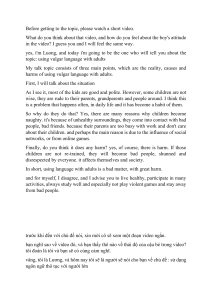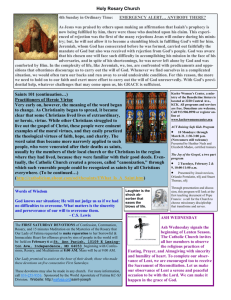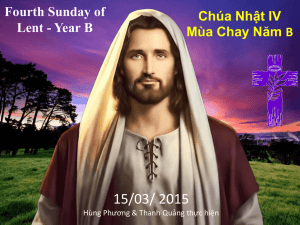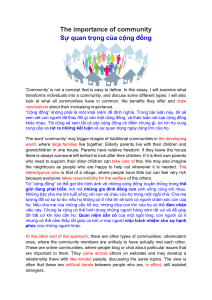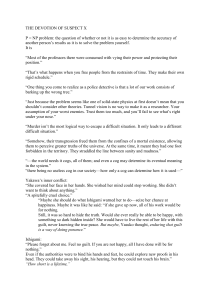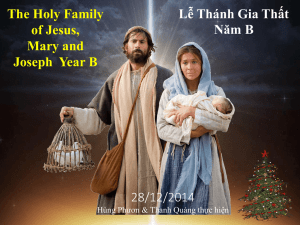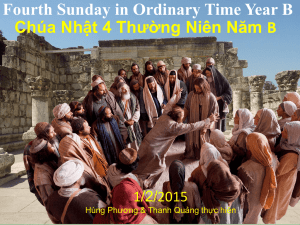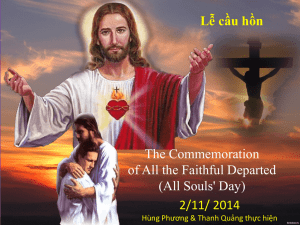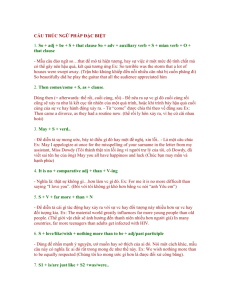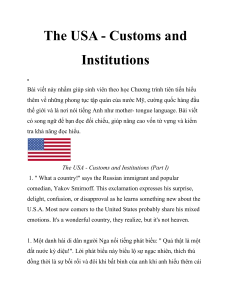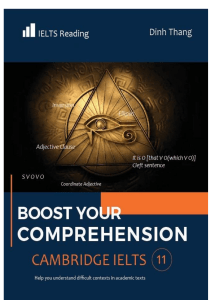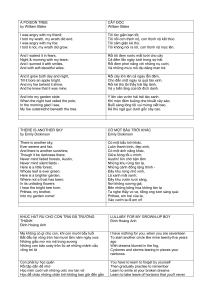- Giáo Xứ Chúa Ba Ngôi
advertisement
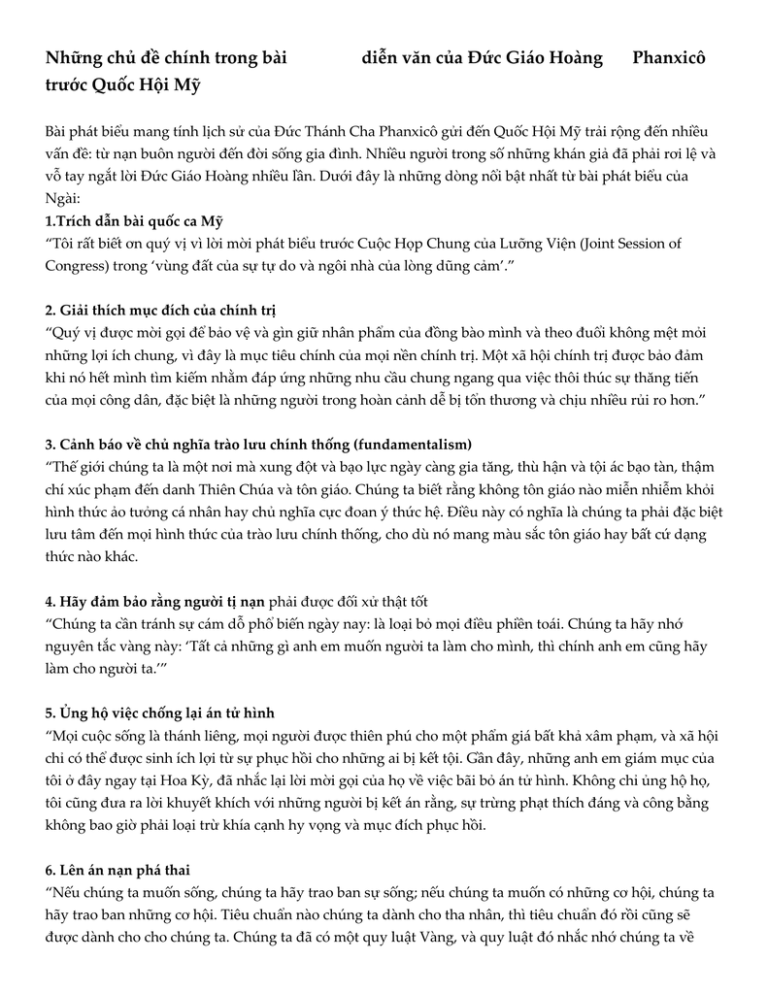
Những chủ đề chính trong bài diễn văn của Đức Giáo Hoàng Phanxicô trước Quốc Hội Mỹ Bài phát biểu mang tính lịch sử của Đức Thánh Cha Phanxicô gửi đến Quốc Hội Mỹ trải rộng đến nhiều vấn đề: từ nạn buôn người đến đời sống gia đình. Nhiều người trong số những khán giả đã phải rơi lệ và vỗ tay ngắt lời Đức Giáo Hoàng nhiều lần. Dưới đây là những dòng nổi bật nhất từ bài phát biểu của Ngài: 1.Trích dẫn bài quốc ca Mỹ “Tôi rất biết ơn quý vị vì lời mời phát biểu trước Cuộc Họp Chung của Lưỡng Viện (Joint Session of Congress) trong ‘vùng đất của sự tự do và ngôi nhà của lòng dũng cảm’.” 2. Giải thích mục đích của chính trị “Quý vị được mời gọi để bảo vệ và gìn giữ nhân phẩm của đồng bào mình và theo đuổi không mệt mỏi những lợi ích chung, vì đây là mục tiêu chính của mọi nền chính trị. Một xã hội chính trị được bảo đảm khi nó hết mình tìm kiếm nhằm đáp ứng những nhu cầu chung ngang qua việc thôi thúc sự thăng tiến của mọi công dân, đặc biệt là những người trong hoàn cảnh dễ bị tổn thương và chịu nhiều rủi ro hơn.” 3. Cảnh báo về chủ nghĩa trào lưu chính thống (fundamentalism) “Thế giới chúng ta là một nơi mà xung đột và bạo lực ngày càng gia tăng, thù hận và tội ác bạo tàn, thậm chí xúc phạm đến danh Thiên Chúa và tôn giáo. Chúng ta biết rằng không tôn giáo nào miễn nhiễm khỏi hình thức ảo tưởng cá nhân hay chủ nghĩa cực đoan ý thức hệ. Điều này có nghĩa là chúng ta phải đặc biệt lưu tâm đến mọi hình thức của trào lưu chính thống, cho dù nó mang màu sắc tôn giáo hay bất cứ dạng thức nào khác. 4. Hãy đảm bảo rằng người tị nạn phải được đối xử thật tốt “Chúng ta cần tránh sự cám dỗ phổ biến ngày nay: là loại bỏ mọi điều phiền toái. Chúng ta hãy nhớ nguyên tắc vàng này: ‘Tất cả những gì anh em muốn người ta làm cho mình, thì chính anh em cũng hãy làm cho người ta.’” 5. Ủng hộ việc chống lại án tử hình “Mọi cuộc sống là thánh liêng, mọi người được thiên phú cho một phẩm giá bất khả xâm phạm, và xã hội chỉ có thể được sinh ích lợi từ sự phục hồi cho những ai bị kết tội. Gần đây, những anh em giám mục của tôi ở đây ngay tại Hoa Kỳ, đã nhắc lại lời mời gọi của họ về việc bãi bỏ án tử hình. Không chỉ ủng hộ họ, tôi cũng đưa ra lời khuyết khích với những người bị kết án rằng, sự trừng phạt thích đáng và công bằng không bao giờ phải loại trừ khía cạnh hy vọng và mục đích phục hồi. 6. Lên án nạn phá thai “Nếu chúng ta muốn sống, chúng ta hãy trao ban sự sống; nếu chúng ta muốn có những cơ hội, chúng ta hãy trao ban những cơ hội. Tiêu chuẩn nào chúng ta dành cho tha nhân, thì tiêu chuẩn đó rồi cũng sẽ được dành cho cho chúng ta. Chúng ta đã có một quy luật Vàng, và quy luật đó nhắc nhớ chúng ta về trách nhiệm bảo vệ và gìn giữ mầm sống con người ở mỗi giai đoạn phát triển của mầm sống ấy.” 7. Kêu gọi chính phủ hãy trợ giúp cho môi trường “Tôi tin rằng chúng ta có thể tạo nên sự khác biệt, và tôi cũng tin rằng đất nước Hoa Kỳ mà cụ thể là Quốc Hội này đóng một vai trò quan trọng trong sự khác biệt đó. Bây giờ là thời điểm cho những hành động và chiến lược dũng cảm nhằm thực thi một ‘nền văn hóa quan tâm’ và ‘một lối tiếp cận toàn diện để tuyên chiến với đói nghèo, để phục hồi nhân phẩm cho người bị loại trừ, và cũng để bảo vệ tự nhiên.'” 8. Lên án nạn buôn bán vũ khí “Chúng ta phải tự chất vấn chính mình rằng: Tại sao những vũ khí giết người lại đang được bán cho những kẻ đang lên kế hoạch để gây đau thương khôn tả cho nhiều con người và xã hội? Đáng buồn thay, câu trả lời mà chúng ta đều biết, đơn giản là chỉ vì tiền: tiền bạc đang thấm đẫm trong máu, và thường là những giọt máu của người vô tội. Đối diện với sự im lặng đáng xấu hổ và tội lỗi này, nhiệm vụ của chúng ta là phải đương đầu với vấn nạn này và ngăn chặn nạn buôn bán vũ khí.” 9. Trợ giúp các gia đình “Gia đình quan trọng biết bao để xây dựng đất nước này! Và gia đình cũng quý giá biết bao để duy trì nguồn nâng đỡ và động viên! Tuy nhiên, tôi không thể che giấu nỗi lo lắng của mình về gia đình, nơi đang bị đe dọa từ bên trong lẫn bên ngoài, điều mà có lẽ trước đây chưa bao giờ có. Những mối tương quan nền tảng đang bị nghi ngờ, chẳng hạn như chính nền tảng của hôn nhân và gia đình. Tôi chỉ có thể nhắc lại tầm quan trọng, và trên hết là sự phong phú và vẻ đẹp của đời sống gia đình.” 10. Xin gởi đến những người Mỹ vĩ đại “Một đất nước chỉ có thể được xem là vĩ đại, khi nó ủng hộ cho tự do như tổng thống Lincoln đã làm; khi nó cổ vũ cho nền văn hóa giúp người dân có thể ‘mơ’ về những quyền lợi chính đáng nhất cho tất cả đồng bào của mình, như mục sư Martin Luther King đã theo đuổi; khi nó dám tranh đấu cho công bình và chống lại sự áp bức, như Người-tôi-tớ-của-Chúa là bà Dorothy Day đã miệt mài thực hiện; như hoa trái Đức tin đã trở nên những cuộc đối thoại và gieo rắc hạt giống hòa bình trong lối chiêm niệm của nhà thần bí Thomas Merton . (Romereports, 24-09-2015). Chuyển ngữ: Giuse Phạm Đình Ngọc, S.J. Viet Catholic October 4, 2015 27th Sunday in Ordinary Time Mark 10:2-16 2 The Pharisees approached [Jesus] and asked, "Is it lawful for a husband to divorce his wife?" They were testing him. 3 He said to them in reply, "What did Moses command you?" 4 They replied, "Moses permitted him to write a bill of divorce and dismiss her." 5 But Jesus told them, "Because of the hardness of your hearts he wrote you this commandment. 6 But from the beginning of creation, 'God made them male and female. 7 For this reason a man shall leave his father and mother (and be joined to his wife), 8 and the two shall become one flesh.' So they are no longer two but one flesh. 9 Therefore what God has joined together, no human being must separate." 10 In the house the disciples again questioned him about this. 11 He said to them, "Whoever divorces his wife and marries another commits adultery against her; 12 and if she divorces her husband and marries another, she commits adultery." 13 And people were bringing children to him that he might touch them, but the disciples rebuked them. 14 When Jesus saw this he became indignant and said to them, "Let the children come to me; do not prevent them, for the kingdom of God belongs to such as these. 15 Amen, I say to you, whoever does not accept the kingdom of God like a child will not enter it." 16 Then he embraced them and blessed them, placing his hands on them. Background: Last Sunday the gospel text ended with Jesus’ exhortation to get rid of those areas that lead one to sin. The gospel for this week almost directly follows last Sunday’s text. In between are the following three verses. “Everyone will be salted with fire. Salt is good, but if salt becomes insipid, with what will you restore its flavor? Keep salt in yourselves and you will have peace with one another. He set out from there and went into the district of Judea and across the Jordan. Again crowds gathered around him and, as was his custom, he again taught them.” (Mark 9:4910:1) Mark’s community would have recognized that Jesus is in the location that was governed by Herod, the one who had John the Baptist imprisoned and beheaded for speaking out against Herod’s marriage to his brother’s wife. They would also recognize that the Pharisees’ question regarding divorce is not a simple request to hear Jesus’ teaching on the matter, but an attempt to diminish Jesus’ status and increase their own. The question and Jesus’ response focus on the disparity between what is permitted and the ideal that God intends. Jesus states that God’s intent from the beginning of creation is that husband and wife should be one. What God brings together as one is incapable of being divided. What Moses permitted was quite different. In verses 10-12 Jesus continues his reflection with his disciples, away from the crowd and the Pharisees. Here he raises the possibility for a woman to divorce her husband, at least in theory. This would have been quite shocking for his disciples, because the Jewish culture would not have considered this a possibility. Women were more like property, and had value because of their reproductive potential. Marriages were arranged by families to bring two families together. The ones to be married did not have a choice in the matter. If a husband divorced his wife, shame was cast on the men of her family. These male relatives were expected to make the situation right even if that meant bloodshed. If a couple was found to be in an adulterous relationship, the husband of the woman was shamed. A woman did not have enough status in this culture to be shamed. This male-dominated way of thinking could not conceive of adultery by a husband as a sin against his wife. Jesus’ teaching in verse 11 would be a totally new perspective for the Jewish community. However, Roman law at the time did allow for a woman to divorce her husband. That this Roman perspective was being incorporated by Jesus himself, or by Mark as he reflects back on the teaching of Jesus, would have been difficult to accept for those who struggled to maintain the purity of their traditions. They would see any Roman influence as representative of their oppressors standing between them and their rightful position as God’s chosen people. The text offers no insight as to why the disciples prevented the children from coming to Jesus. Instead the text says only that Jesus was upset with the disciples’ behavior. Nor does Mark tell us how it is that one should be like a child. It would be helpful to remember that in that time, children, like women, had no rights or esteem in themselves. Without an explanation or the context for Jesus’ behavior, the apparent intent is to show who Jesus saw value in. Jesus is treating those who had no status, in society or in the religious tradition of the day, as having value and importance in the eyes of God. Reflection Questions: 1. Among the people you know, what are some of the reasons people marry? 2. Have you heard people equating what is legal within church law/practice with what is morally right? 3. Who are the people in your community whose status does not give them the same protection as the prominent members of the community? 4. 5. Are there places in your life where you know you yourself are not living up to the ideals God is calling you to? In the first section of the gospel text, Jesus says that God has brought together a wife and her husband and they are now one. Would there be other examples of things God has brought together as one? 6. Jesus seems to have deliberately traveled into the area where his cousin John was killed by Herod and is confronted by the same issue. Are there areas, either geographical or emotional, that you avoid because of past experiences? Does Jesus’ action in the gospel text speak to you? 7. Do you find yourself grateful for those who teach us and show us the ideals God desires for us, even if living it fully would be impossible for most of us? 8. What part of this gospel text is most meaningful for you? Do you find it meaningful because it offers comfort, because it challenges, or for some other reason? On Wednesday of each week, the Gospel for the upcoming Sunday is posted at the following link: http://www.ilritiro.org/gospel-reflections.aspx. You are invited to share your own reflections with others at this website. Reflection questions are written by Fr. Paul Gallagher, OFM. They are edited by Sister Anne Marie Lom, OSF and Joe Thiel. To be added to the distribution list send your name and email address to fr.paul.gallagher.ofm@gmail.com.
